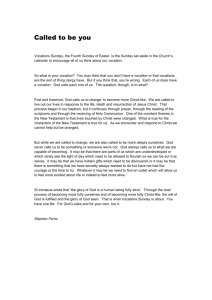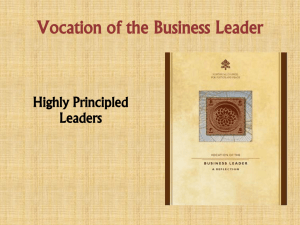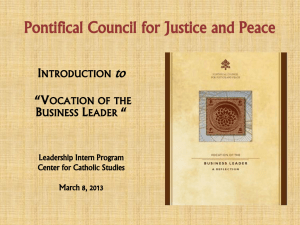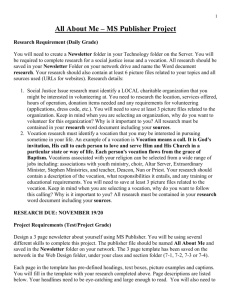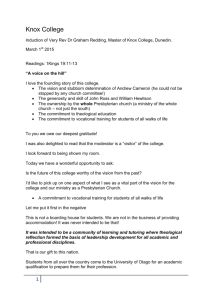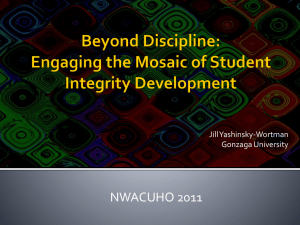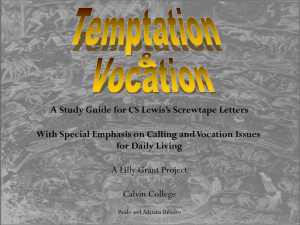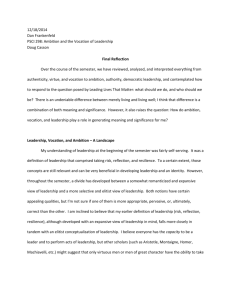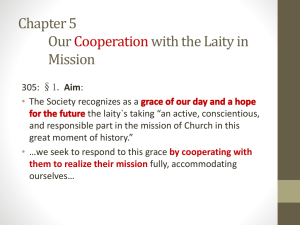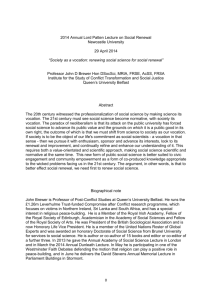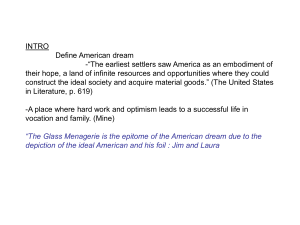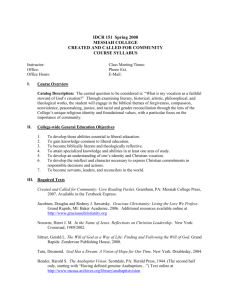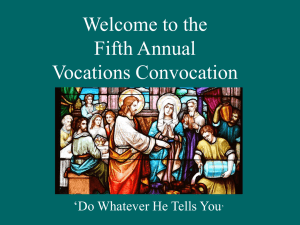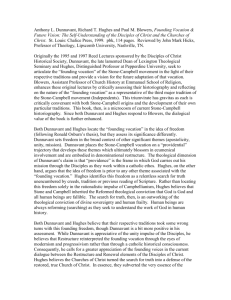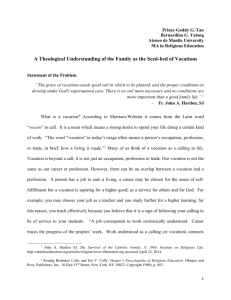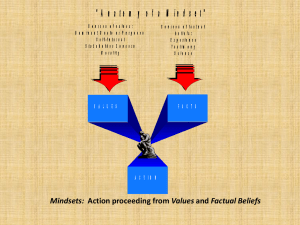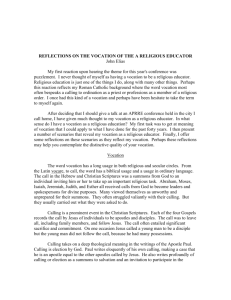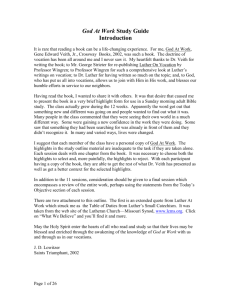Vocation - Faith, Food & the Environment
advertisement
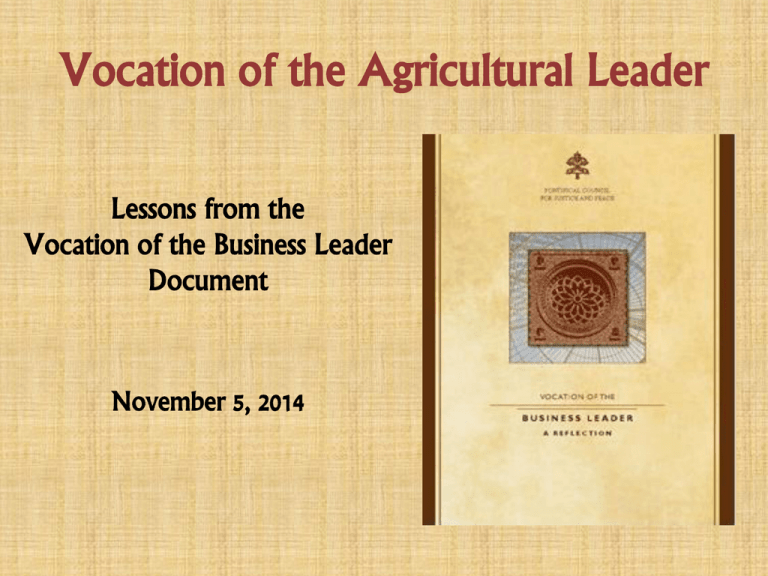
Vocation of the Agricultural Leader Lessons from the Vocation of the Business Leader Document November 5, 2014 VOCATION OF THE BUSINESS LEADER Outline 1. Context and Challenges of the Document 2. Title of the Document: Vocation of the Business Leader 3. The Structure of the Document: See, Judge, Act 4. Questions for Table Discussion 1. CONTEXT and CHALLENGES Two Ditch Problem 1. Accommodation: “Christians . . . have accommodated themselves to the world, living as if God does not exist. They not only live in the world, but they have become of the world. When Christian business leaders fail to live the Gospel in their organisations, their lives ‘conceal rather than reveal the authentic face of God and religion’.” 2. Anti-Business Attitudes: 2. TITLE: The VOCATION of the Business Leader The Logic of Gift ‘From everyone who has been given much, much will be demanded; and from the one who has been entrusted with much, much more will be asked’ (Lk 12:48).” Vocation “Free to Choose” and “Being Chosen” • “There is no more feeling more desperate than that of being free to choose, and yet without the specific compulsion of being chosen.” (Philip Rieff) • “Men are not free when they are doing just what they like. The moment you can do just what you like, there is nothing you care about doing. . . . Men are free when they are obeying some deep, inward voice of religious belief” (D.H. Lawrence). The Vocation of the BUSINESS Leader Business “institutions are highly diverse, including cooperatives, multinational corporations, small entrepreneurial start-ups, employee-owned businesses, family businesses . . . Some of these businesses are publicly traded stock companies, while most are privately held. Some have revenues larger than many countries, but most are small. Some are owned by thousands of investors, others are owned by a single person or family.” The Vocation of the Business LEADER • “We wish to speak specifically to Christian business leaders . . .” • “We wish to speak to all business leaders of good will . . .” • “From CEOs to heads of teams to those with informal influence . . .” 3. The Structure of the Reflection “An important part of the business leader’s vocation . . . entails seeing clearly the situation, judging with principles that foster the integral development of people, and acting in a way which implements these principles in light of one’s unique circumstances.” Seeing Reality Permanent White Water • • • • Globalization Communication Technology Financialization Cultural Changes Seeing Reality • Seeing Things Whole and Not Just Parts • Seeing beyond “Neighbors” – to God’s Image. A Framework of Judgment The Good Business Does • Good Goods: making goods which are truly good and services which truly serve; Good Goods Good Work Good Wealth • Good Work: organizing work where employees develop their gifts and talents; and • Good Wealth: creating sustainable wealth and distributing it justly. The Good Business Does Good Goods Good Work Good Wealth Acting Acting Receiving: “The person ‘comes in the profoundest sense to himself not through what he does but through what he accepts’ not through what he achieves but what he receives.” Acting Receiving: “The person ‘comes in the profoundest sense to himself not through what he does but through what he accepts’ not through what he achieves but what he receives. Giving: “The second act to which the Church calls the business leader is giving in a way which responds to what has been received.” 4. Questions for Table Discussion • Vocation How does one’s vocation inform the complexities and challenges of the agricultural marketplace? How would one manage such complexities as if faith mattered? • See, Judge, Act: See: What do you see are the principal challenges and opportunities within Agriculture? Judge: What principles do you see are most important in defining the Good Agriculture does? Act: What are the necessary actions of the Agricultural Leader? “God created me to do Him some definite service; He has committed some work to me which He has not committed to another. I have my mission—I never may know it fully in this life, but I shall be told it in the next. Somehow, I am necessary to His purposes… I am a link in a chain, a bond of connection between persons. He has not created me for naught.” (John Henry Newman) The Logic of Gift and Vocation of the Leader “He [Peter Maurin] did not begin by tearing down, or by painting so intense a picture of misery and injustice that you burned to change the world. Instead he aroused in you a sense of your own capacities for work, for accomplishment. He made you feel that you and all (people) had great and generous hearts with which to love God. If you once recognized this fact in yourself you would expect and find it in others ‘the art of human contacts’ Peter called it happily.” Dorothy Day Giving • Good Goods: seek new and improved innovative products and services in a world of great need, especially for the poor; effective and just supply chain practices; manage negative externalities, especially environmental difficulties; fair and honest marketing and advertising; etc. • Good Work: humane job design; mission driving hiring practices and orientation; deep and useful leadership formation; employee training and development; just firing and layoffs; evaluation systems that promote the growth of coworkers; etc. • Good Wealth: good stewardship of resources in reducing waste and rework, managing inventory, etc.; transparent financial and accounting practices; socially responsible investment; just allocation of resources in relation to receivables/payables, wages, prices, returns; community giving; etc. Vocation of the Agricultural Leader Michael Naughton Director, John A. Ryan Institute for Catholic Social Thought Center for Catholic Studies University of St. Thomas mjnaughton@stthomas.edu
